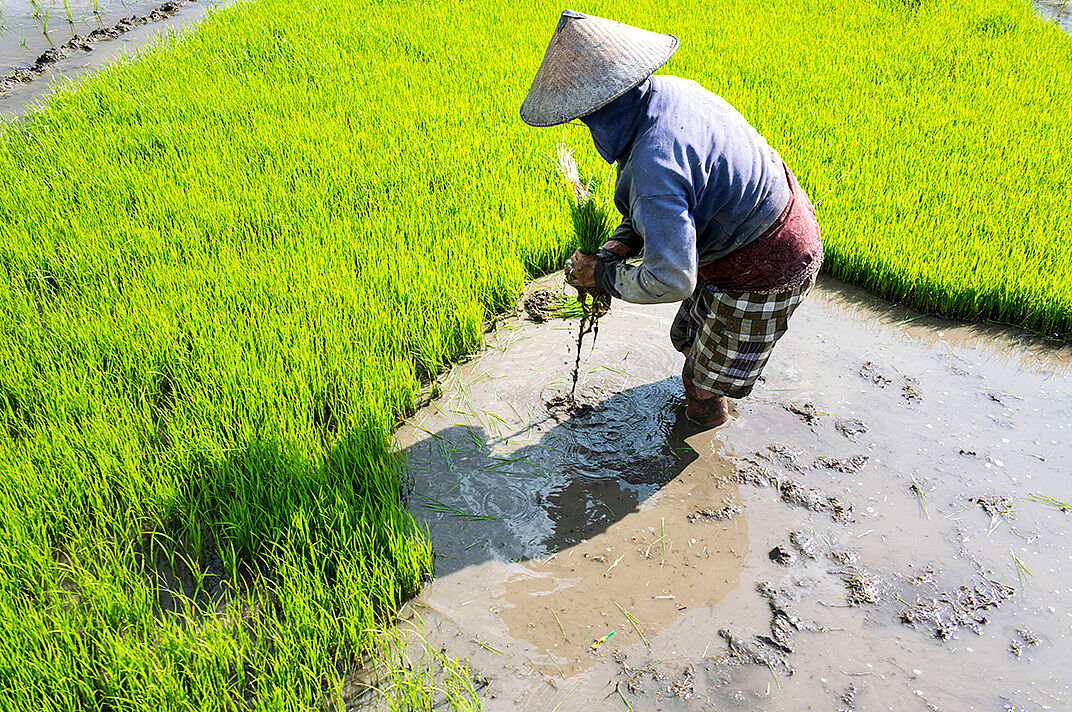Evangelische Bank eG
IBAN: DE85 5206 0410 0000 0001 24
BIC: GENODEF1EK1
Indonesia: Organic Farming
In Kulawi, a region in Central Sulawesi, the population is severely affected by the consequences of climate change. The Protestant Indonesian Church in Donggala (GPID) is therefore training farmers in sustainable organic farming. This not only mitigates climate change, it also gives farmers greater financial stability.
The consequences of climate change are felt throughout Indonesia, particularly in the Kulawi region of Central Sulawesi. The weather is fluctuating more and more between extremes. Rainy and dry seasons are both becoming longer. On top of this, the consequences of decades of mismanagement are being felt since much of the rainforest was cut down to make way for monocultures. Today, farmers can no longer rely on their harvests. This makes their work challenging and threatens the livelihoods of large parts of the population.
The Protestant Indonesian Church in Donggala (GPID) is aware of the problems and is taking action to remedy them. It has networked with organisations and research institutions. Together, they train farmers in organic farming methods and agroforestry. These techniques increase soil fertility, reduce the use of chemicals, protect forest diversity and secure the livelihoods of farmers.
The church offers training courses and workshops on agroforestry and organic farming. It trains farmers as well as multipliers who pass on their knowledge to the local communities. It provides machinery and seeds that farmers cannot afford themselves. The church is focusing its aid in particular on poor families and women. Traditionally, women in the region have a great deal of agricultural knowledge, for example on how to preserve seeds and planting techniques. Involving them strengthens both the project and boosts women’s role in society. What’s more, the GPID organises training courses and excursions for children, young adults and adults to raise their awareness about climate change and its consequences. The local population is involved throughout the entire project cycle, from planning to implementation and evaluation.
Indonesia
In Central Sulawesi, about 40 percent of agricultural yields are threatened by climate change.

Tradition and innovation combined
The project of the Protestant Church in Indonesia in Donggala prevents damage caused by climate change and offers farmers in Kulawi the opportunity to preserve and develop their deeply rooted traditional customs and local knowledge. This not only helps farmers achieve better harvests, it also contributes to a healthy environment for future generations. Tradition helps shape the future!
Your donation will help support the project “Organic farming in Indonesia: tradition takes new directions“.
The GPID project aims at mitigating climate change and the resulting damage to the environment. It seeks to broaden the range of crops grown by farmers, making them less dependent on fluctuations in the climate. Organic farming methods are used to increase soil fertility and reduce the use of chemicals. The GPID aims to improve the income of families at risk of poverty and strengthen the role of women in society.
Together with experts and research organisations, the GPID organises training courses and workshops on agroforestry and organic farming. It provides machinery and seeds. The train-the-trainer model is used to train specialists who will pass on their knowledge to the local communities. The church makes sure that families at particular risk of poverty are included in the project.
The Indonesian Protestant Church in Donggala (GPID) is a young church. It was founded in 1965 to unite Christians from different ethnic groups. The GPID attempts to raise the level of education in the region and deepen Christian awareness through schooling and further training courses. Another area of its work is the care and education of orphans. The GPID currently has about 32.000 members in 170 congregations.
We are pleased to hear that you are interested in this project. If you have any general questions, please use the contact form below. We are also happy to help you personally if you have any questions or require further information – by phone or by E-mail.
Djoko P. A. Wibowo
Liaison Secretary Indonesia
+49 711 636 78 -36